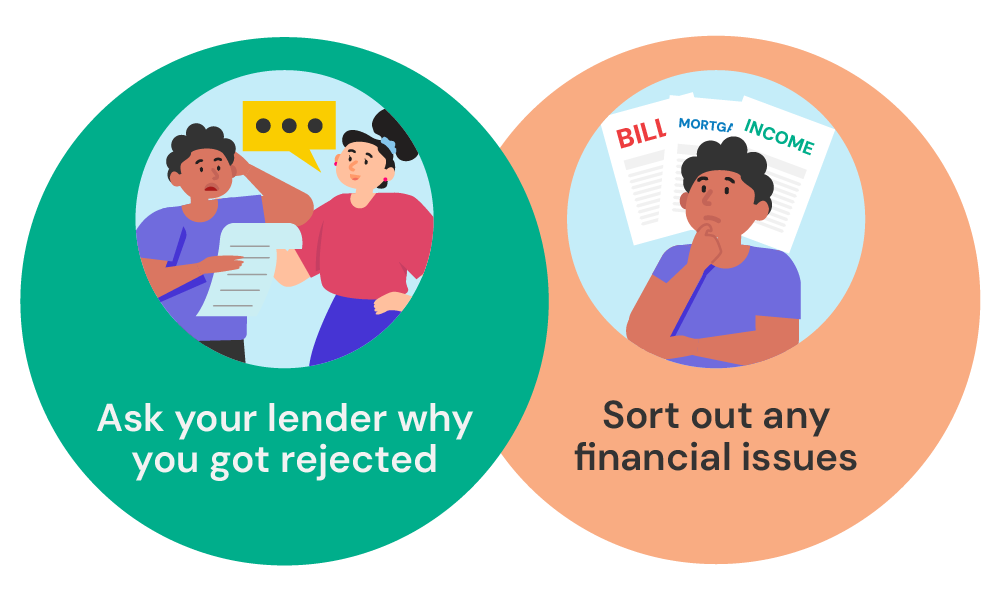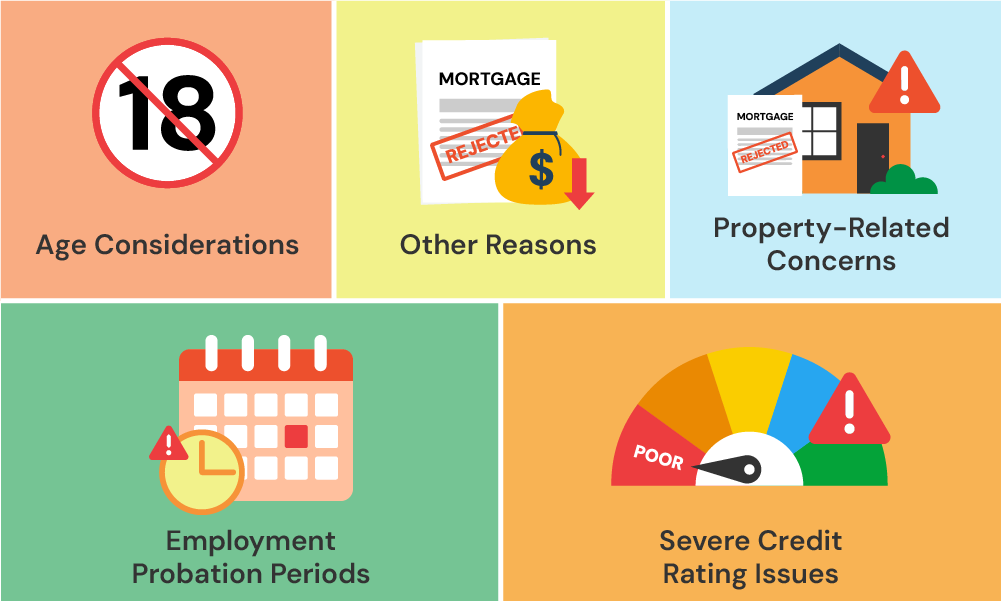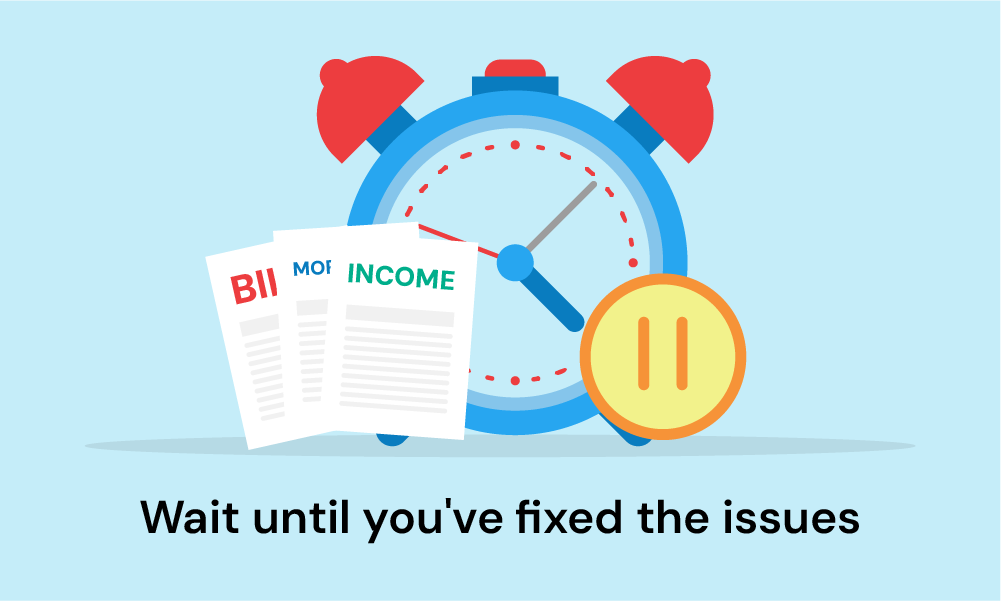- Is Precise Mortgages Strict with Their Lending Criteria?
- What Should You Do If Precise Mortgages Declined?
- Is an Appeal Possible After Being Declined by Precise Mortgages?
- Common Reasons for Mortgage Application Rejection by Precise
- When Is the Right Time to Re-apply for a Mortgage After Being Declined?
- The Bottom Line
What Should I Do If Precise Mortgage Declined My Application?

Being turned down for a mortgage can be a disheartening experience, one that many in the UK encounter during their mortgage journey.
It’s a moment filled with uncertainty, especially when you’ve invested time and hope in the application process.
If your mortgage application was turned down and you’re left scratching your head about what to do next, this guide is here for you.
We’ll look at common reasons why Precise might say no and show you steps to take for a better chance next time.
Remember, while this guide is handy, getting advice just for you is the best way to save time and worry, and make smart choices about your mortgage.
Is Precise Mortgages Strict with Their Lending Criteria?
Precise Mortgages stands out in the UK market for its specialist approach. They’re not your typical high street bank, and this means they look at mortgage applications a bit differently.
But does this make them stricter? Well, it’s a bit of both. They’re known to be more flexible in some areas, like working with people who’ve had credit problems in the past.
But, they can be quite firm when it comes to other things, like your age or if you’ve had really serious credit issues.
So, it’s fair to say Precise Mortgages has its own set of rules that might seem strict in some areas but quite accommodating in others.
What Should You Do If Precise Mortgages Declined?
If you’ve been rejected by Precise Mortgages, here’s what you can do:
Don’t Rush to Re-apply
It might be tempting to try again straight away or go to another lender, but hold on. Applying too many times in a short period can harm your credit score. It’s better to take a step back and understand what went wrong this time.
Understand Why You Were Rejected
When Precise turns down your application, it’s crucial to pinpoint the exact reasons. Was it your credit history, your current income level, or issues with the property you’re interested in?
Understanding these specific factors will guide you in making the necessary adjustments for a successful future application.
Get an Expert’s Advice
Before proceeding, consider consulting a mortgage broker for tailored advice. They can help you understand the rejection, suggest what to change, and even find other lenders who will accept your application.
A broker knows the ins and outs of different lenders, including Precise, so they can give you advice that’s right for your situation.
To save yourself from the endless search for the right broker, reach out to us. We’ll match you with your ideal broker who can help you solve your financial situation.
Develop a Plan to Improve Your Application
Based on the feedback and your broker’s guidance, plan actionable steps to improve your application. If your financial situation contributed to the decline, now is the time to work on it.
Focus on building a stronger deposit, improving your credit score, or ensuring your job situation is stable. These steps can significantly enhance your appeal to mortgage lenders.
Explore Different Lending Options
A decline from Precise is not the end of your mortgage journey. Different lenders have varied criteria.
Consider exploring other mortgage providers who might have requirements that align better with your current situation.

Is an Appeal Possible After Being Declined by Precise Mortgages?
Yes, you can appeal a decision if Precise Mortgages declines your application. It’s not a closed door.
The process for appealing usually involves getting in touch with them, often through their website or customer service.
You’ll need to provide reasons why you believe the decision should be reconsidered. This could mean showing extra evidence or explaining any mistakes.
However, before you appeal, make sure you understand why you were declined in the first place. This way, you can address these issues in your appeal, giving you a better chance of success.

Common Reasons for Mortgage Application Rejection by Precise
Understanding why Precise might turn down a mortgage application is crucial. Let’s look deeper into these reasons and explore what you can do to improve your chances next time:
Precise often views being in a probation period at work as a risk because your job stability isn’t guaranteed yet.
To strengthen your application, wait until you’ve passed your probation and can show a stable employment history.
If you can provide evidence of previous long-term employment or a strong job offer letter, it might also help.
Severe Credit Rating Issues
A history of significant debt, defaults, or bankruptcies can be concerning to Precise. They need assurance that you can handle the responsibility of a mortgage.
Property-Related Concerns
If Precise is worried about the property you want to buy, it could be due to structural problems or non-standard construction materials.
Before making an offer, have a thorough property survey done to identify any potential issues.
If problems are found, you can either negotiate repairs with the seller or look for a property that’s less likely to raise concerns with mortgage lenders.
Age Considerations
Your age can impact your mortgage application, especially if you’re close to or in retirement. Precise might be concerned about your income stability as you age.
To address this, provide evidence of a secure retirement income, such as pensions or investments. You can also look for shorter mortgage terms that finish before you’re likely to retire.
Other Reasons
There could be various other factors affecting your application, like your overall financial health or the size of your deposit.
To improve your chances, ensure your financial records are in good order, and try to save for a larger deposit, as this reduces the lender’s risk.
Additionally, having a clear budget and reducing unnecessary expenses can demonstrate financial responsibility.
In all these cases, consulting a mortgage broker can provide tailored advice and help you find lenders more suited to your circumstances. They can offer insights into how different lenders, including Precise, evaluate applications and guide you in preparing a stronger application.
Remember, every situation is unique, so getting personalised advice is key.

When Is the Right Time to Re-apply for a Mortgage After Being Declined?
Deciding when to re-apply for a mortgage after a decline isn’t just about picking a date. It’s about ensuring you’re in a better position than before.
Generally, it’s advisable to wait at least six months. This period allows you to address any issues that led to your initial application being turned down.
To improve your chances next time, here’s what you can do:
Fix Credit Issues
If your credit score is a problem, use this time wisely to enhance it. Pay down debts and ensure all your bills are paid on time.
Avoid taking out new loans during this period and regularly check your credit report for any errors that need correcting. A cleaner credit history can significantly boost your chances of approval.
Stabilise Your Employment
If you were on probation or recently changed jobs, staying in your current role for a bit longer can demonstrate stability to lenders. A consistent income from stable employment makes you a more attractive candidate for a mortgage.
Save for a Bigger Deposit
The more you can save for a deposit, the better. A larger deposit not only reduces the risk for the lender but can also secure you more favourable mortgage rates. Aim to save as much as you can during this waiting period.
Reduce Unnecessary Spending
Cut back on non-essential expenses to improve your debt-to-income ratio. This step demonstrates to lenders that you’re responsible with your finances and can manage your spending effectively.
Resolve Property Issues
If there were issues with the property, look for one that’s less likely to have problems or address those issues beforehand. Properties without major concerns are more likely to be approved by mortgage lenders.
Organise Your Financial Records
Keep all relevant financial documents like bank statements and payslips organised and up to date. Having your financial records in good order can make the mortgage application process smoother and faster.
Consult a Mortgage Broker
A broker can offer tailored advice on when to re-apply and how to strengthen your application. They can guide you through improving your financial profile and suggest lenders more suited to your situation.
By following these steps, you’ll be better positioned for a successful mortgage application. Remember, a decline is not the end of your journey; it’s an opportunity to come back stronger and more prepared.

The Bottom Line
After diving into what to do when Precise Mortgages turns down your application, let’s wrap things up:
- Know that Precise Mortgages uses a flexible yet strict approach in different aspects. Tailor your application to meet their unique criteria.
- Take time to understand the reasons if you’re declined. Pinpoint whether it’s due to your financial situation, the property itself, or your job status. Identifying the root cause is crucial for finding a solution.
- Remember, being declined isn’t the end. You have the option to appeal. Just ensure you’re clear about the reasons for your initial rejection.
- Address common rejection reasons such as being in a probationary period at work, having credit rating issues, facing property concerns, or age-related factors. With the right strategy, these challenges can be overcome.
- Wait for at least six months before you reapply for a mortgage. Use this period to enhance your financial health, secure your job position, and possibly increase your deposit.
- Seek advice from a mortgage broker. They can provide tailored guidance and help you choose a lender that might be more suitable for your circumstances. Brokers are well-versed in the criteria of various lenders, including Precise Mortgages.
If you’re feeling stuck after being declined for a mortgage and want to make things easier, we’re here to help.
Get in touch with us, and we’ll connect you with an FCA-qualified broker. They’ll understand your specific mortgage situation and guide you towards the best solution.
Get Matched With Your Dream Mortgage Advisor...

Frequently Asked Questions
Do Precise Mortgages refund valuation fees after rejection?
If you’ve paid for a property valuation and then your application is rejected, unfortunately, Precise Mortgages usually doesn’t refund these fees. Valuation fees are for the service already done on assessing the property’s value.
Can self-employed individuals get mortgages from Precise?
Yes, Precise Mortgages offers options for self-employed people. You’ll generally need to have been self-employed for at least a year and have your financial records, like tax returns, to apply.
What is Precise Mortgages’ refurbishment buy-to-let product?
Precise Mortgages’ Refurbishment Buy-to-Let Product is ideal for landlords or property investors who are looking to purchase buy-to-let properties that require some refurbishment.
This unique mortgage option combines a bridging loan, which provides the funds needed for refurbishing the property, with a traditional buy-to-let mortgage. It’s a great fit if you’re aiming to enhance a property’s value or appeal before renting it out.
By opting for this product, you can manage both the purchase and the refurbishment of property under one financial arrangement, making it a convenient choice for those investing in property that needs a bit of work.



